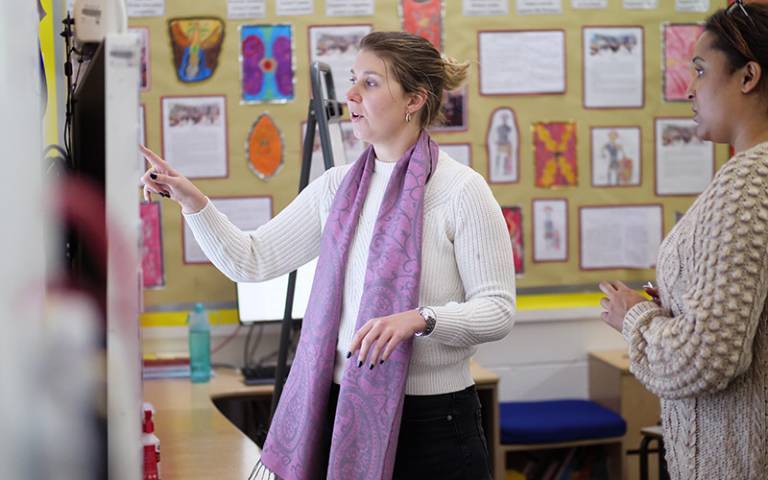Influencing government policy to improve working life for teachers
Research led by IOE, UCL’s Faculty of Education and Society, has helped to change policy on teacher workload, galvanising public debate and activating guidance and funding for support.

29 April 2022
Excessive teacher workload is linked to challenges with teacher recruitment, retention, job satisfaction and mental health. Until recently there was little robust evidence illustrating how many hours teachers work per week, what they spend time on and how this has changed over time. There was also limited understanding of how the workloads of teachers in England compare with those in other countries.
How does England measure up?
Pivotal to this sustained programme of research was the Teaching and Learning International Study (TALIS) 2013 report for England authored by the team at IOE and published in 2014. Commissioned by the Department for Education (DfE), the report was a collaboration between the IOE and RM Education, a survey provider that collected questionnaire data from 150 schools and 2,500 lower secondary school teachers across England. The same survey was also conducted in over 30 other countries.
The study found that lower secondary teachers in England work longer hours each week than teachers in most other developed countries, spending more time on marking, lesson preparation and administration than their international counterparts.
The report also looked at teacher job satisfaction, finding that ‘unmanageable’ workloads were prompting low job satisfaction for teachers in England.
A new IOE research report analysing data from the 2018 wave of the TALIS survey suggested little progress had been made in teacher workload or satisfaction, and that primary school teachers faced similar issues to those reported by secondary school teachers.
Shifting the burden from teachers
The research team communicated the need for urgent action, along with policy recommendations to the government, following the publication of the reports. This prompted the government’s 2014 launch of the Workload Challenge which gathered information from 40,000 school staff to investigate teacher workload.
In response to the concerns raised, the DfE developed a range of measures to monitor and reduce excessive workloads and introduced a new protocol to prevent hasty implementation of curriculum changes.
Schools’ regulator Ofsted also responded to the findings, producing new guidance to highlight that teachers should not feel pressured to carry out burdensome tasks for the sake of satisfying inspectors. The regulator also published three profession-led policy reviews investigating lesson planning, marking policies and data management to help facilitate workload reduction.
Looking to the future
The National Education Union used IOE’s evidence to develop policies such as a Life Balance for Teachers Model Policy Checklist and to inform its response to the 2019 DfE Teacher Workload Survey.
Media coverage has raised awareness of the issue, with think-tanks, teaching unions and others contributing to and galvanising public debate on teacher workloads.
These impressive impacts and the awareness of excessive teacher workloads developed by IOE researchers are set to continue, with new research from the team adding data from the UK Labour Force Survey and the UK Time Use Diaries and the Teacher Tapp phone app to their analysis.
Research synopsis
Influencing government policy on teacher workload
Research led by IOE, UCL’s Faculty of Education and Society, has highlighted issues of excessive teacher workload in England when compared with other countries, and the detrimental effects of this excess on both teachers and their employers. These findings have informed policy change and led to regular monitoring to help reduce workloads, with the Department for Education (DfE) issuing guidance and funding new projects to support workload reduction.
Project team: Professor John Jerrim, Professor John Micklewright, Rebecca Allen, Dr Andrew Jenkins, Professor Sam Sims
Links
- Professor John Jerrim's academic profile
- Professor John Micklewright's academic profile
- Dr Andrew Jenkins' academic profile
- Professor Sam Sims' academic profile
- IOE, UCL's Faculty of Education and Society
- IOE REF 2021
- Life Balance for Teachers Model Policy Checklist
- 2019 DfE Teacher Workload Survey
- TALIS survey
Image
- Image credit: UCL
 Close
Close

